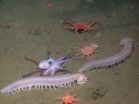(Press-News.org) This press release is available in German.
In about half of all prostate tumours, there are two genetic areas that are fused with one another. When this is not the case, the exact way cancer cells originate in prostate tumours was not clear until now. Scientists at the Max Planck Institute for Molecular Genetics in Berlin, in cooperation with a team of international researchers, were able to show that the genesis of this fusion-negative prostate cancer has epigenetic causes: methyl groups are distributed differently over the DNA in the cancer cells than in healthy cells. Thanks to this knowledge, physicians may be able to achieve greater specificity in treating prostate tumours in future. In addition, the aberrant DNA methylations can be used as a potential biomarker for identifying prostate cancer.
About half of all cases of prostate cancer originate through fusion of two genetic areas. As a result, the ERG gene is activated in these fusion-positive cells and prostate cells propagate, leading to tumourigenesis. Fusion-positive prostate cancer can be treated with PARP1 inhibitors that turn off the repair system of the tumour cells.
However, it has not been clear how prostate tumours without a fused ERG gene acquire their tumourigenic potential. Now, a team of Max Planck scientists headed by Michal-Ruth Schweiger from the Department of Vertebrate Genomics have investigated the global DNA methylation pattern – i.e. at which locations the DNA possesses methyl groups – in fusion-negative tumours. They have discovered that, compared to fusion-positive tumours, the fusion-negative tumours display more aberrant DNA methylations, which are most likely causative for the malignant transformation of prostate cells.
Moreover, the scientists found large amounts of the enzyme EZH2 in the cells of the tumours. This histone methyltransferase couples histone and DNA methylation and also transfers methyl groups to the DNA. Further functional analyses link EZH2 to the aberrant DNA methylations in fusion gene negative tumours. As reason for the significantly increased amount of EZH2 the scientists found very low concentrations of miRNA-26a, a micro-RNA that targets EZH2 for degradation.
###The researchers think that their findings will further enhance diagnosis and specific treatment options for prostate cancer patients. "Regions with different DNA-methylation patterns can be used as biomarkers to diagnose specific subgroups of cancer", says Schweiger. "In addition, new medications for fusion-negative prostate cancer could operate with greater specificity and therefore be more effective." It is likely that other types of cancer are also based on these kinds of pronounced epigenetic modifications.
Börno ST, Fischer A, Kerick M, Fälth M, Laible M, Brase JC, Kuner R, Dahl A, Grimm C, Sayanjali B, Isau M, Röhr C, Wunderlich A, Timmermann B, Claus R, Plass C, Graefen M, Simon R, Demichelis F, Rubin MA, Sauter G, Schlomm T, Sültmann H, Lehrach H, Schweiger MR
Genome-wide DNA methylation events in TMPRSS2:ERG fusion negative prostate cancers implicate an EZH2 dependent mechanism with miRNA-26a hypermethylation
Cancer Discovery, Published OnlineFirst August 28, 2012; doi: 10.1158/2159-8290.CD-12-0041
Epigenetic causes of prostate cancer
Researchers observe modified methylation patterns in a group of prostate cancers
2012-09-05
ELSE PRESS RELEASES FROM THIS DATE:
Harnessing anticancer drugs for the future fight against influenza
2012-09-05
Medical Systems Virology group at the Institute for Molecular Medicine Finland (FIMM) at the University of Helsinki, together with its national and international collaborators, developed a new cell screening method that can be used to identify potential anti-influenza drugs. The researchers were able to identify two novel compounds with anti-influenza activity, obatoclax and gemcitabine and prove the efficacy of a previously known drug saliphenylhalamide.
The study was recently accepted for publication in the Journal of Biological Chemistry and is now available online.
Influenza ...
DNA sequences need quality time too - guidelines for quality control published
2012-09-05
Like all sources of information, DNA sequences come in various degrees of quality and reliability. To identify, proof, and discard compromised molecular data has thus become a critical component of the scientific endeavor - one that everyone generating sequence data is assumed to carry out before using the sequences for research purposes.
"Many researchers find sequence quality control difficult, though", says Dr. Henrik Nilsson of the University of Gothenburg and the lead author of a new article on sequence reliability, published in the Open Access journal MycoKeys. ...
Archaeology team announces 'huge step forward' in King Richard III search
2012-09-05
Archaeologists from the University of Leicester who are leading the search for King Richard III have announced they have overcome the first significant hurdle of their investigation – and made a huge step forward in the search for the King by locating the church where he was buried.
The University of Leicester is leading the archaeological search for the burial place of King Richard III with Leicester City Council, in association with the Richard III Society.
In 1485 King Richard III was defeated at the battle of Bosworth. His body, stripped and despoiled, was brought ...
Study uncovers simple way of predicting severe pain following breast cancer surgery
2012-09-05
WOMEN having surgery for breast cancer are up to three times more likely to have severe pain in the first week after surgery if they suffer from other painful conditions, such as arthritis, low back pain and migraine, according to a Cancer Research UK study published today (Wednesday) in the British Journal of Cancer.
Of the women surveyed, 41 per cent reported moderate to severe pain at rest, and 50 per cent on movement, one week after their surgery. Most patients having breast cancer surgery are discharged home by this time.
Psychological state was also important, ...
When do we lie? When we're short on time and long on reasons
2012-09-05
Almost all of us have been tempted to lie at some point, whether about our GPA, our annual income, or our age. But what makes us actually do it?
In a study forthcoming in Psychological Science, a journal of the Association for Psychological Science, psychological scientists Shaul Shalvi of the University of Amsterdam and Ori Eldar and Yoella Bereby-Meyer of Ben Gurion University investigated what factors influence dishonest behavior.
Previous research shows that a person's first instinct is to serve his or her own self-interest. And research also shows that people are ...
Children exposed to 2 phthalates have elevated risk of asthma-related airway inflammation
2012-09-05
Children exposed to diethyl phthalate (DEP) and butylbenzyl phthalate (BBzP)—phthalate chemicals commonly found in personal care and plastic products—have elevated risk of asthma-related airway inflammation, according to researchers at Columbia Center for Children's Environmental Health (CCCEH) at the Mailman School of Public Health.
Of the 244 children aged 5 to 9 in the study, all had detectable levels of phthalates in their urine although these varied over a wide range. Higher levels of both phthalates were associated with higher levels of nitric oxide in exhaled ...
Telaprevir: Added benefit in certain patients with hepatitis C
2012-09-05
The drug telaprevir (trade name: Incivo®) has been available for treatment of chronic hepatitis C infection of genotype 1 since autumn 2011. In an early benefit assessment pursuant to the "Act on the Reform of the Market for Medicinal Products" (AMNOG), the German Institute for Quality and Efficiency in Health Care (IQWiG) examined whether telaprevir offers an added benefit compared with the present standard therapy.
According to the findings of the assessment, the new drug telaprevir offers advantages in various groups of patients with chronic hepatitis C infection ...
New study examines how ocean energy impacts life in the deep sea
2012-09-05
Durham, NC — A new study of deep-sea species across the globe aims to understand how natural gradients in food and temperature in the dark, frigid waters of the deep sea affect the snails, clams, and other creatures that live there.
Similar studies have been conducted for animals in the shallow oceans, but our understanding of the impact of food and temperature on life in the deep sea — the Earth's largest and most remote ecosystem — has been more limited.
The results will help scientists understand what to expect in the deep sea under future climate change, the researchers ...
Gender equality influences how people choose their partners
2012-09-05
Men and women clearly have different strategies for picking sexual partners, but the reason why differences exist is less clear. The classic explanation for these differences has been that men's and women's brains have evolved to make certain choices, but a new study in Psychological Science, a publication of the Association for Psychological Science, suggests that evolution is only part of the answer.
To be a 'success' in evolutionary terms, women need to have access to resources for raising offspring, and men need to have access to fertile females. Researchers have ...
AGU: Glacial thinning has sharply accelerated at major South American icefields
2012-09-05
WASHINGTON –For the past four decades scientists have monitored the ebbs and flows of the icefields in the southernmost stretch of South America's vast Andes Mountains, detecting an overall loss of ice as the climate warms. A new study, however, finds that the rate of glacier thinning has increased by about half over the last dozen years in the Southern Patagonian Icefield, compared to the 30 years prior to 2000.
"Patagonia is kind of a poster child for rapidly changing glacier systems," said Michael Willis, lead author of the study and a research associate at Cornell ...
LAST 30 PRESS RELEASES:
The Lancet: Single daily pill shows promise as replacement for complex, multi-tablet HIV treatment regimens
Single daily pill shows promise as replacement for complex, multi-tablet HIV treatment regimens
Black Americans face increasingly higher risk of gun homicide death than White Americans
Flagging claims about cancer treatment on social media as potentially false might help reduce spreading of misinformation, per online experiment with 1,051 US adults
Yawns in healthy fetuses might indicate mild distress
Conservation agriculture, including no-dig, crop-rotation and mulching methods, reduces water runoff and soil loss and boosts crop yield by as much as 122%, in Ethiopian trial
Tropical flowers are blooming weeks later than they used to through climate change
Risk of whale entanglement in fishing gear tied to size of cool-water habitat
Climate change could fragment habitat for monarch butterflies, disrupting mass migration
Neurosurgeons are really good at removing brain tumors, and they’re about to get even better
Almost 1-in-3 American adolescents has diabetes or prediabetes, with waist-to-height ratio the strongest independent predictor of prediabetes/diabetes, reveals survey of 1,998 adolescents (10-19 years
Researchers sharpen understanding of how the body responds to energy demands from exercise
New “lock-and-key” chemistry
Benzodiazepine use declines across the U.S., led by reductions in older adults
How recycled sewage could make the moon or Mars suitable for growing crops
Don’t Panic: ‘Humanity’s Last Exam’ has begun
A robust new telecom qubit in silicon
Vertebrate paleontology has a numbers problem. Computer vision can help
Reinforced enzyme expression drives high production of durable lactate-based polyester
In Rett syndrome, leaky brain blood vessels traced to microRNA
Scientists sharpen genetic maps to help pinpoint DNA changes that influence human health traits and disease risk
AI, monkey brains, and the virtue of small thinking
Firearm mortality and equitable access to trauma care in Chicago
Worldwide radiation dose in coronary artery disease diagnostic imaging
Heat and pregnancy
Superagers’ brains have a ‘resilience signature,’ and it’s all about neuron growth
New research sheds light on why eczema so often begins in childhood
Small models, big insights into vision
Finding new ways to kill bacteria
An endangered natural pharmacy hidden in coral reefs
[Press-News.org] Epigenetic causes of prostate cancerResearchers observe modified methylation patterns in a group of prostate cancers



